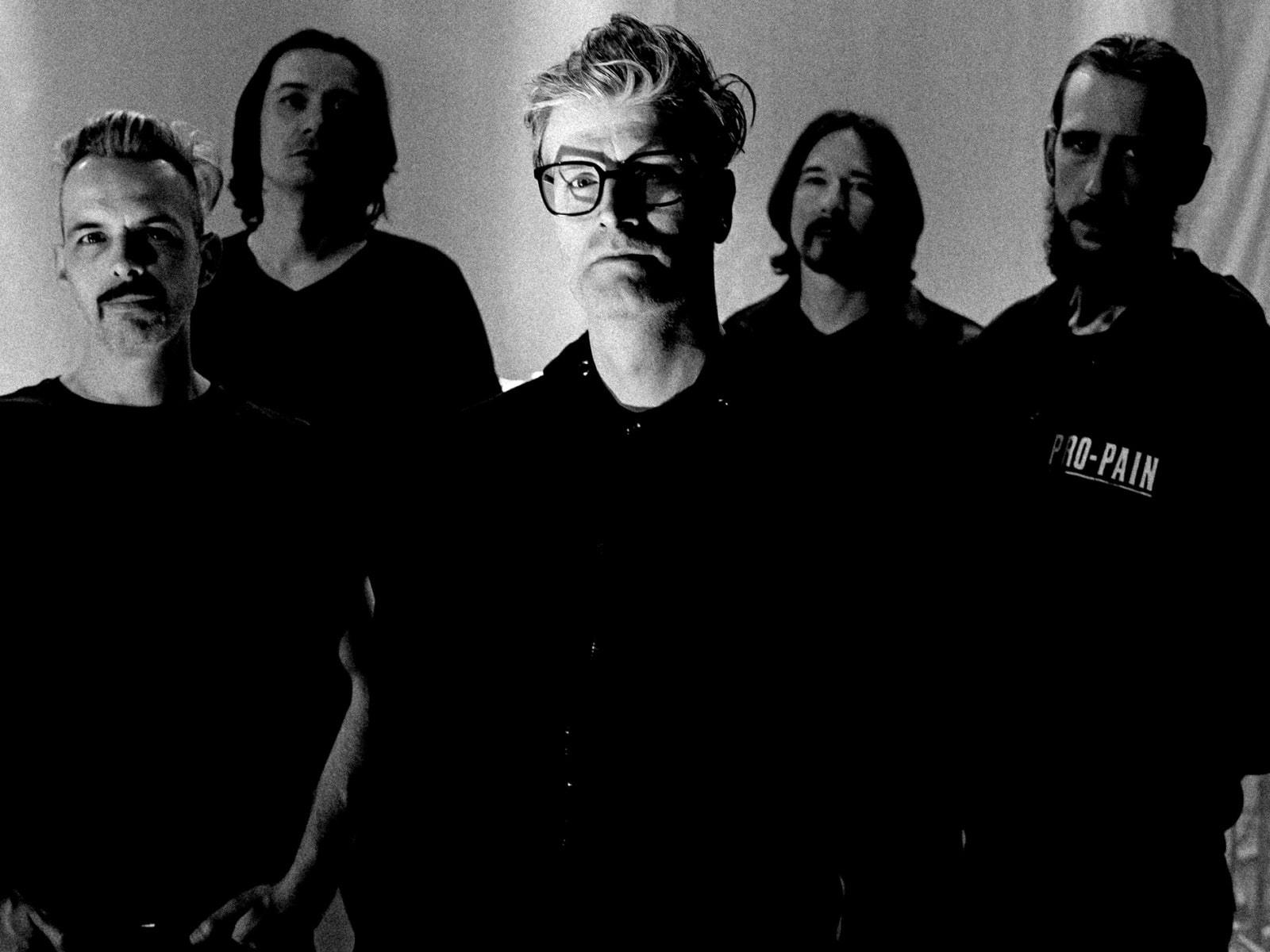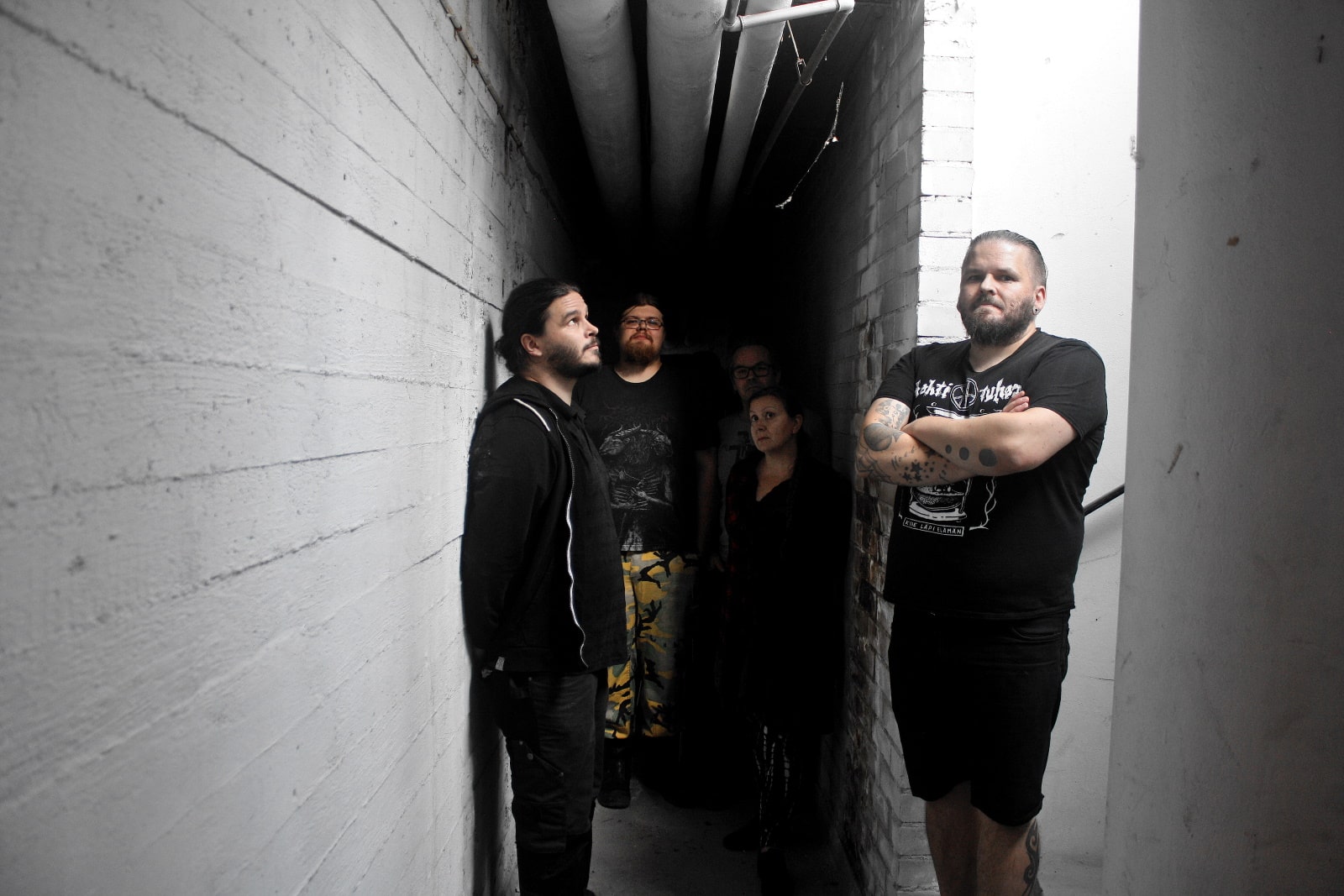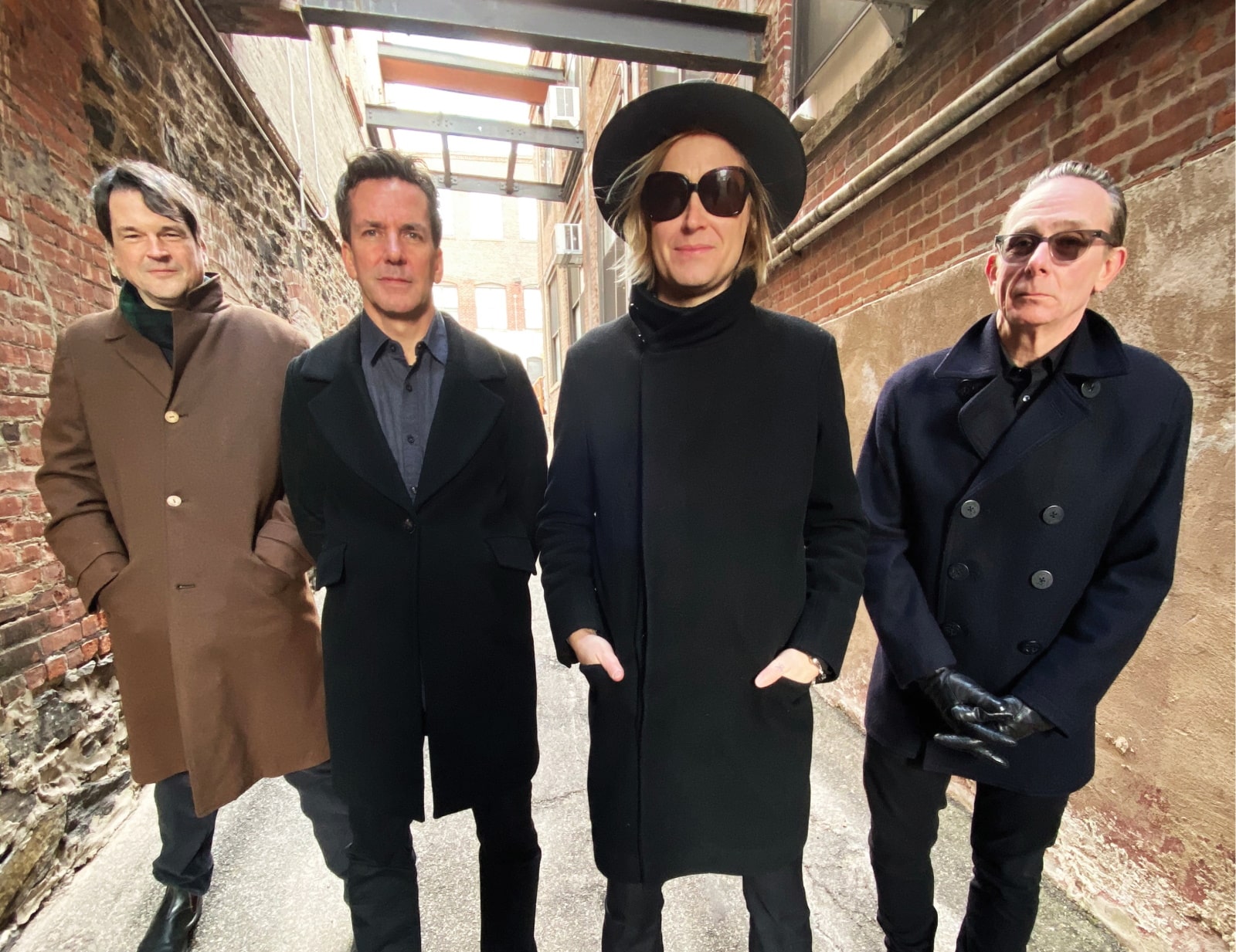One month since the release of their political first single “Buy More Sh!t”, Belgian band KILLTHELOGO (former members Of FACEDOWN and .CALIBRE) are joining us for a special in-depth track by track commentary on each and every song from their new album “Reset”, scheduled for a physical release via [PIAS] Recordings in early 2022.
Asked about their debut single, the band revealed that “Buy More Sh!t” was inspired on a comedy piece by comedian Ronny Chieng in his show ‘Asian Comedian Destroys America’. “In some of the sections Ronny talks about our entitlement to instant service and our absolute surrender to the driving forces of the market. “Place it in my hand, before I know I need it.” That is brilliant!”
“We are all subservient to this behaviour in some form or to some extent.” – admits the band. “The industries that are selling us their often superfluous products and services are actively manipulating our subconscious psychology to trigger our basal instincts, all aimed at stimulating and increasing our consumption. More sales, more recurrence, more profit. We are powerless against these marketing forces because we are spread too thin most of the time. We want some form of instant gratification to oppose the stress and high paced lifestyle that has been imposed on us. Give it to me. Now.”
This is not a reunion, it is a powerful sequel. This new outfithas taken all that motivation and vision they had with .calibre, back in 2001, and applied it to today’s world. And what an angry and polarised world it has become. The band aims to unite and inspire new and older generations with a new sense of community. It’s a growing and gentle force against the pressures of the power-whores.
With two original .calibre members and a few impressive additions to the line-up, killthelogo brings you new songs and ideas, but also some nostalgic flash-backs to the late 90ies and early 2000 vibes. Both on and off stage.

killthelogo dabbles in the frequencies of vital anger and decisive revolt. That is why this music needs to be loud and aggressive. But it also has to be precise, effective, compelling and accessible. Catchy grooves are as important as high-gain volume. With this band, people will understand from the first note, that they are hearing something inescapable and necessary.
Growing up in the 90’s, all members in killthelogo were exposed to bands that showed clear examples of music with extreme dynamics and infectious energy: Rage Against The Machine, Tool, Rammstein, Nine Inch Nails, System of a Down, Nirvana, … These were all defining bands that addressed important personal, social and political issues, with a sound that greatly amplified what they were saying in the lyrics. killthelogo went to school on all of that and made their own rendition.
There isa deliberate outspoken and physical energy to the band’s sound, visual language and live performances. You may turn up just to hear the music, but you could leave with a few bruises and a wake-up call. The band is all about intensifying and galvanising life.
𝑘𝑖𝑙𝑙𝑡ℎ𝑒𝑙𝑜𝑔𝑜 𝑖𝑠 𝑎 𝑙𝑜𝑛𝑔 𝑡𝑒𝑟𝑚 𝑝𝑟𝑜𝑗𝑒𝑐𝑡 𝑜𝑛 𝑐𝑜𝑛𝑠𝑢𝑚𝑒𝑟 𝑑𝑖𝑠𝑜𝑏𝑒𝑑𝑖𝑒𝑛𝑐𝑒 & 𝑠𝑜𝑐𝑖𝑎𝑙 𝑎𝑐𝑡𝑖𝑣𝑖𝑠𝑚
In the full spirit of its predecessor .calibre, they seek to help translate the drivers of social and political change to the larger public. As a branch in the wide scope of artistic expression, the project wants to be an extra and loud voice in the social debate and the ‘separation of powers’ that safeguard the balance in society.
“The people in killthelogo are just like you, greatly flawed and imperfect. And we are not asking for perfection from anyone. We just hope to rekindle your sense of participation and community. Because that is what the people on those top floors fear most: us, talking to and actually understanding each other. We are you, as much as you are this loud and urgent voice! And we are not ashamed to say that we need you.”
The band is: Vocals: Daniel Mies, ex: facedown, .calibre – current: cyclus, (a school of) quiet; Guitar: Niko Poortmans, ex: facedown, .calibre – current: (a school of) quiet; Guitar: Sven Leyemberg, ex: minus 45 degrees, one million seats – current: cyclus; Bass: Herwig Scheck, ex: (a school of) quiet, concrete, peter evrard; Drums: Jonas Sanders, ex: dark sensations, angel crew – current: pro-pain, emptiness
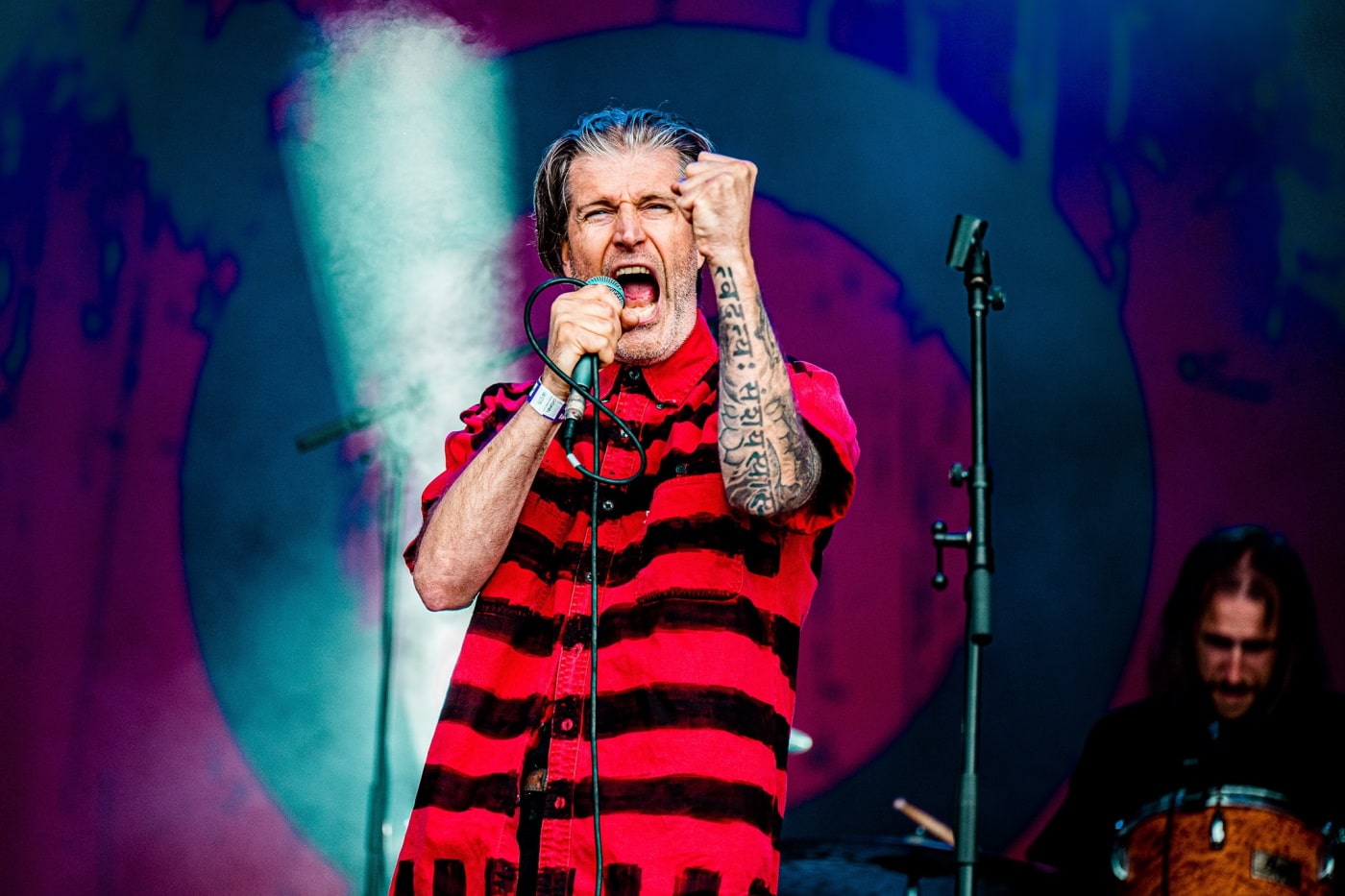
Track by track commentary:
Riot as one:
Daniel Mies – Vocals: This song was based on a selection of riffs, initially written by Sven for another project (Cyclus) we were both involved in. Niko introduced new verses, bridge ideas and dynamic guidelines to make the song less progressive complex metal. It was the first song we finished and the dynamic volume shifts have become a key-dimension in how we produce all killthelogo songs.
Lyrically it is definitely about unification. Imagine all of our fractional movements converging into one harmonious organism of resistance. We, as individuals, are not meaningless and our actions can have profound effects. The ruling paradigms that to dictate our lives, can be broken with a united, gentle force. Even minimal pressure, if applied by many, is irresistible.
The song also highlights the central mission of killthelogo: to shed light on the linchpins of power. How the 1% is controlling every aspect of the lives of the 99%. Each of us can make small changes in our consumer contributions to this market – without giving up our comfort and within our financial scope – that could seriously affect the power structures that rule that very same market. We want our economy to be a service, as intended, not a master. It is as important what you buy, as where you buy it (from).
Buy More Sh!t
Herwig Scheck – Bass: If my mind is not failing me, this is one of the earlier songs that got made. There were already some demos made, when I got asked to join the killthelogo project. We collectively did a lot of changing around in structure, vibe, grooves and general feeling of the song, during the writing and preproduction. Because we all really liked the core of the song but also felt like “something” was missing.
The message of the song was clear from the start. The general feeling and direction we wanted as well, but the practicalities of getting there were quite a task for sure.
The verse riffs and pre-chorus parts (=riffs in between chorus and verse) were swiftly constructed. It was the structure and the chorus of the song that gave us quite a harder time than some of the others. The idea of the chorus pumping and grinding like a machine came, I think, from Niko and once that was there the song achieved its current form easily. There’s quite some rhythmical machine samples mixed into the chorus as well, as to enhance that relentless stamping of the machine. This all adds to the monstrosity of the groove this song has. Daniels’ vocal performance (listen to the distorted screams/cries in the background!) lifts this song to a higher level. It was a surprise to all of us to discover how mean and heavy this slow song can feel while playing it live.
The Deep State
Niko Poortmans – Guitar: We had a real struggle about that intro riff. Should we play it in 4/4 instead 7/8. I’m glad we ended up keeping it in 7/8 rhythm, because this really sucks you in and pulls you into that groove in an addictive way. It is a very simple song to play but that’s were it gets much of its appeal, all the grooves and part changes make sense and keep flowing.
In my personal preconception stage and while tracking the vocals, I definitely heard the Bowie-esque “Control of the Deep State” singing in the chorus, more as a background vocal in relation to the “Control Control Control” shout-outs in that same part. But this decision by mixer David Bottrill – to swap them – works out nicely.

Taxes
Daniel Mies – Vocals: There is no hiding the hardcore & metal backgrounds of most of the members in killthelogo. This was our impression of what we would do with louder music with fast parts. How can we play aggressive riffs without fully committing to the typical rhythmical metal or hardcore solutions? How can we give it our own twist? I love how the rhythm section fully focusses on special grooves and consequently gives the metal type guitars a totally different function. Because of the groove changes, a black metal guitar riff can sound like a mixture between new wave and garage rock.
Hearing those style shifts reminded me of noise/garage/grunge rock and inspired me to lean into that off-tune, whiny type of singing on the bridge. It brings me full circle back to my roots of Sonic Youth and The Pixies. Or maybe I’m the only one that hears it that way?
The content of the song is quite evident in the lyrics: not everyone pays an equal percentage of taxes, which is our agreed form of societal contribution, no? Some pay nothing because they have clever legal departments to avoid it altogether. The weakest shoulders carry the heaviest burdens. We have grown to accept that as a given, but shouldn’t we actually keep questioning that? Actively? Loudly? Forcefully?
Boutique Pharma
Niko Poortmans – Guitar: The original riffs for this song were already written about 10 years earlier, somewhere in the summer of 2010. We kept them locked in box, in the shape of a raw demo, awaiting future use. I always wanted to go back to playing heavy music but we just didn’t find the right musicians to start it off. At least no one we clicked with from the outset. But once we got together with Sven, Herwig and Jonas it made total sense to pull out the old demo.
A lot of the structure was already in place so this one came together pretty quickly (not counting the 10 years). Except for the solo! I played many versions, eventually getting a bit frustrated, but I couldn’t decide on the right build-up. Eventually, Herwig (bass) just cut it up and reassembled it in a way that made sense. After that, I just had to learn to play it accordingly . We asked Snoop Dogg for some backings on the verse but he couldn’t make it, so we ended up doing our own little bit of De la Soul style fun. No real guns or explosions were used on this song, it’s all programmed.
Warehouse Moguls
Daniel Mies – Vocals: The riffs and basic structure of this song were introduced by Sven and I remember that we assembled it rather quickly. First in a band rehearsal, with finishing structural changes at Niko’s home studio. There is a clear deviation from the typical song format because of the double chorus. To clarify: everything from 0:33 up until 1:05 is actually the chorus in our mind. So two riffs and two parts glued together as a chorus. I’m sure it was not interpreted as such by mixer David Bottrill, but it was written with that in mind.
It is a song about the big shot sociopaths. The self-proclaimed enlightened entrepreneurs. The fake advocates of change and social revolution that brutally protect the status quo through oppression, corruption, discreditation, human rights abuses and even military action.
There is no fixing the system without aiming for the linchpins. If we neutralise the controlling effects of the 1% richest people on this planet, redistributing and reallocating their wealth to the social and ecological benefit of us all, we will eventually tip the scales into balance.
Everything is warehoused these days: from nano-chips to humans. Apparently our value is measured by the same parameters used for raw materials. But we are real people! How fast can our desperate energy be converted into wealth? And how fast can this wealth be extracted from our reach? Someone is responsible, but no one is held accountable.
In The Factory
Sven Leyemberg – Guitar: ‘In The Factory’ was created in a spontaneous moment at rehearsal, as an ‘ending’ or outro type idea for Warehouse Moguls. Everything started with a simple melodic riff I came up with in a jam, that we all felt had the right carrying power to portray the feeling we were aiming for. Niko quickly blended some complementary ideas to support the growing volume. It all clicked rather naturally and resulted in a beautiful guitar build-up, smartly enhanced by the rhythm section. I love how smooth and ‘easy’ the bass and drums sound on this track. A fun song writing experiment that we will repeat in some variation in future albums.
While initially meant as an outro, we often play this song as an intro because the open, slow ending of it gives it a good feeling of anticipation, which is a great vacuum to follow up with something loud or fast.
It is clearly a repetitive piece of music and for its initial function this felt like the most elegant structure. But playing it live and rehearsing it, we thought it deserved a place of its own on the album.
Daniel’s lyrics are of course still connected to the Warehouse Moguls song and stress the central theme of both songs: how we are forced to buy into the mechanisms of elite control. Control and power, without accountability is a deep threat to freedom and personal security.
The imprint of this song, is one of strong emotion. We hope you feel it too.
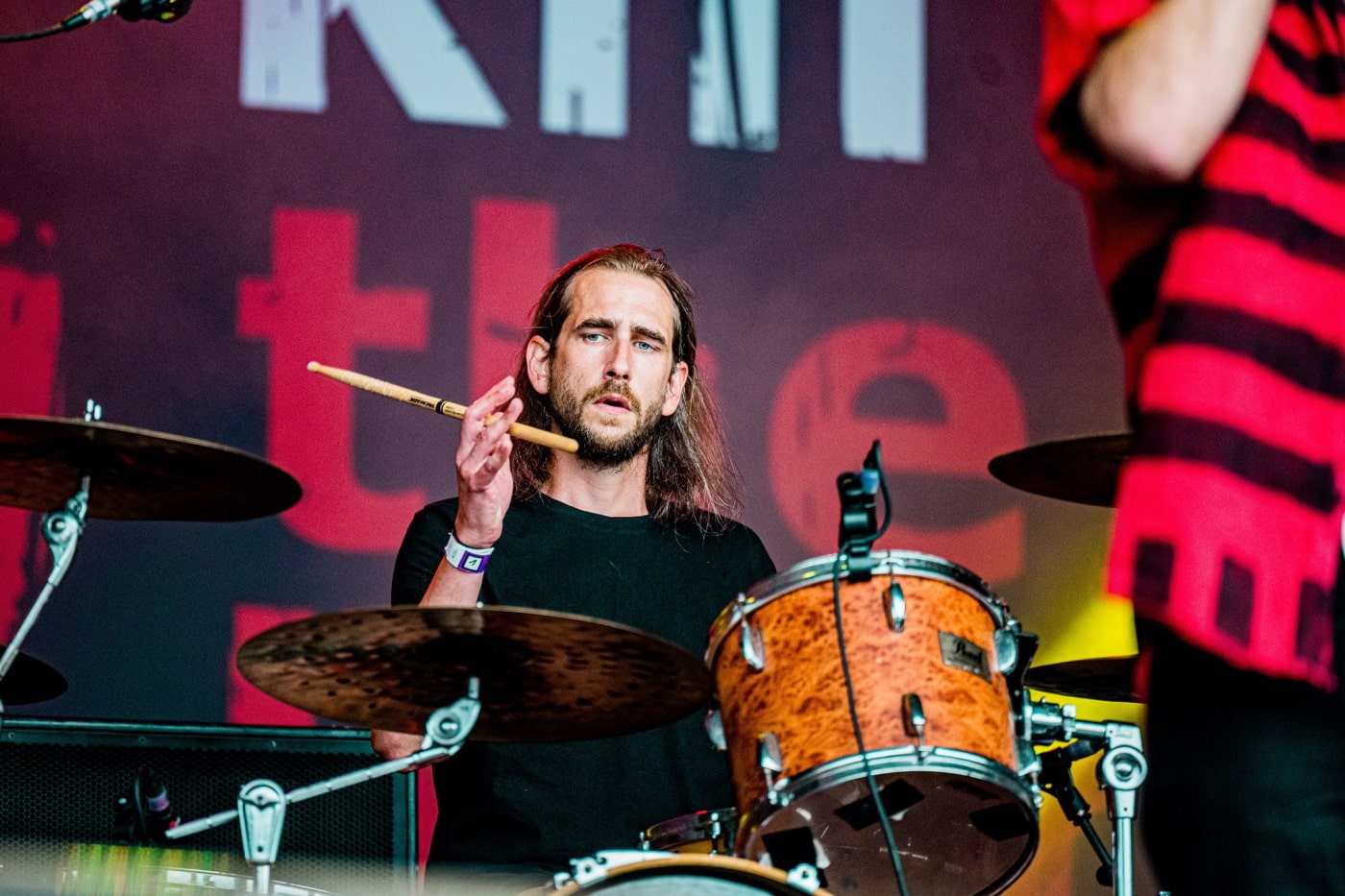
Iconoclast
Jonas Sanders – Drums: Iconoclast is for me one of the catchiest songs of this album and I really think we mastered the dynamic work on this one. It was quite easy to write, everything fell into place right away. We eliminated a few surplus riffs (e.g. there was a Smashing Pumpkins style tail to the chorus) to end up with this compact structure. And we actively chose to make the second verse short and more like a short pause before the end-sprint.
I love the contrast between the heavy choruses and the lighter verses. The chorus has a swing to it that reminds me of some of the prog bands I was listening to when I was younger. The snare part on the verses is an exercise I particularly enjoy and I think it gives the song its unique colour.
For me, coming from a more metal background, it was a real pleasure to write different grooves than what I am used to or generally asked to do for session work. The entire album is riddled with little rhythmic experiments.
Conspiracy
Daniel Mies – Vocals: Conspiracy was a lot more metal in its early stages. It’s also one from the ex-Cylcus metal stock that got remodeled to fit our style of volume dynamics. Especially the verses were revamped and the bridge got totally replaced: from edge metal style aggression to a more funk-rock groove part. When singing the vocals for the bridge, it was suggested by Jo Francken (a great producer that occasionally gave us some valuable ex-machina input) that I should sound ‘exhausted’. So I sprinted a few laps at full speed, ran into the studio and got straight in front of the mic. That’s why it sounds as if I’m catching my breath. Or trying to.
The content is in the title. All layers of our society are infested with corruptions. It is part of human nature and to be expected in every man-made structure. While a system of government should be construed in a way that minimises the possibility of it, it has become quite the contrary. It facilitates and institutionalises it. Today, without any true form of accountability, political leaders have free reign to do as they please without real repercussions or checks. Industry leaders are taking good advantage of that by influencing or bribing politicians behind the curtains. We have a society where sociopaths and psychopaths gravitate towards positions of power, both in industry and in politics. They can thrive there, again without ever being held accountable, leaving a trail of social and ecological carnage.
There are numerous echelons of conspiracy in place to cover up all those corruptions. To make sure we don’t see them, or don’t believe them. “The greatest trick the Devil ever pulled was convincing the world he didn’t exist.”
Fuck Your Data
Sven Leyemberg – Guitar: ‘Fuck Your Data’ is definitely an intentional wink to new metal music from the 1990s and early 2000s. We feel that some incredibly good albums came out during that era and we sometimes look back at it with nostalgia. Memories of pile-ups and stagediving immediately pop to mind. Playing a metal show then, was uncomplicated still. While the entire ‘reset’ album is a modern day tribute to those days, this song is a culmination of that concept. A respectfully nod to our roots. And a hope for the future.
It may sound direct and simple but this song was certainly not an easy feat to perform. Finding the right balance was a challenge. It almost didn’t make the album because of that balancing act. Just before the last moment of recording, it got its final shape and structure. The song is catchy and has the right groove without being too much married to the past.
A breath of fresh air and a headbanging pounder, with a very, very clear message: ‘Fuck Your Data’.
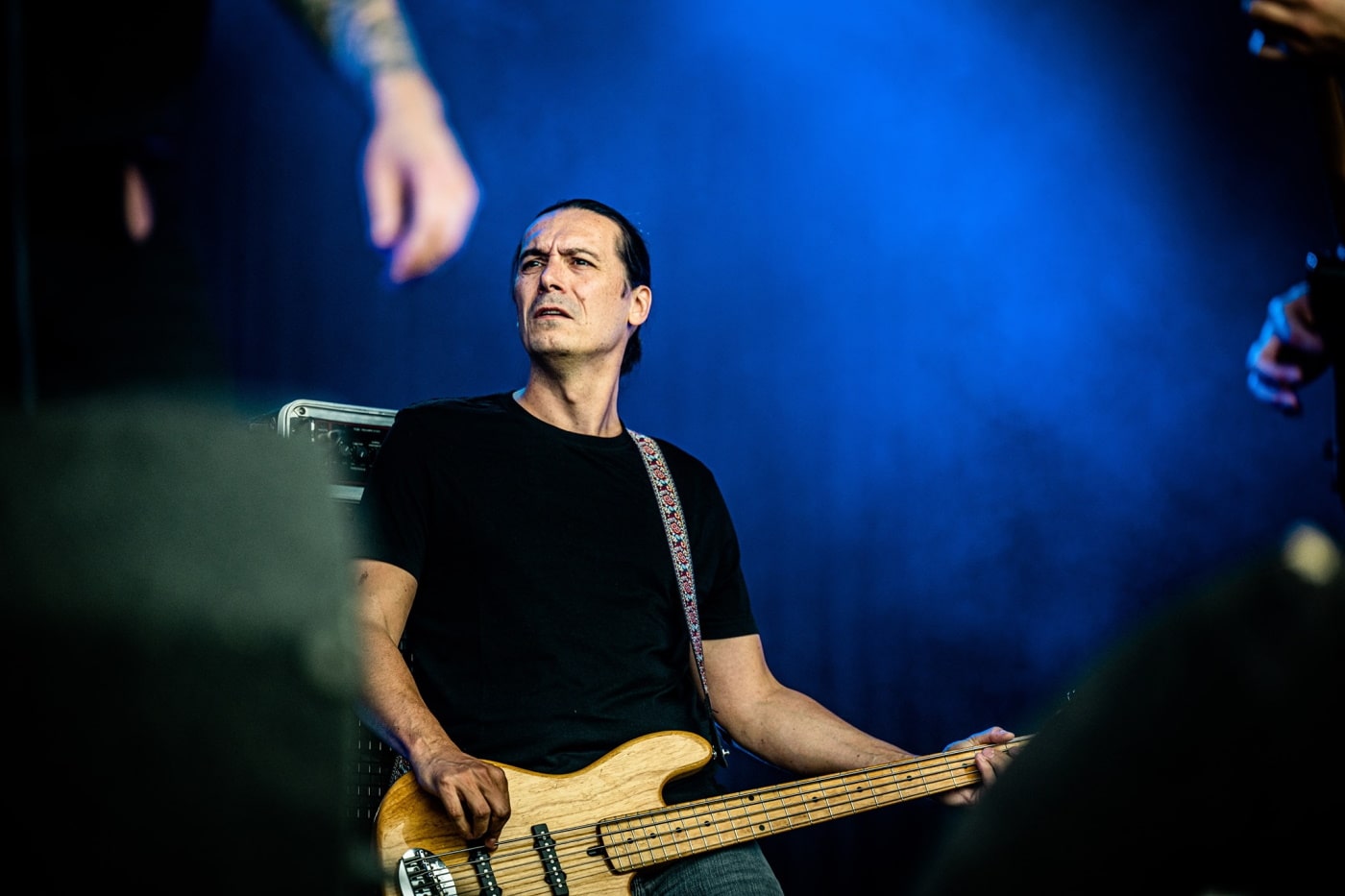
Clear as day
Jonas Sanders – Drums: If I remember well, Clear as Day was one of the most challenging songs for us to write in terms of diversity within the structure. The verses and chorus are quite straight to the point when it comes to what will fit, rhythmically. But linking all the different mood changes between all the different parts of the song was rather tricky! The verses are super funky, but it remains quite trippy at the same time thanks to the lo-fi vocals and the airy guitars. The pre-chorus is an excellent anticipating build-up to the chorus with all its craziness. It gives us all a little moment to loosen up after the tension that we were holding until then.
Ups and downs, that’s how it feels for two and a half minutes until we reach the bridge, where things open up a bit. I just love Daniel’s part on this, the melodic and catchy vocal-line on top of the mess we are doing, it is just perfect. The end of the song has a bit of a world-music vibe to it, Latin grooves, calm voice, sweet guitar tones, making it my favourite moment of the album.
Translucent
Herwig Scheck – Bass: To best bring out the atmosphere and general arc of the song we decided to do this in one live session, with us all playing together in one single room. We dressed that base track up with some overdubs and guest appearances for the percussion and synth sounds. In the writing process of the album it was Niko that came up with the idea/skeleton of this song. It started out as a long jam on an acoustic guitar and parts were added during the preproduction. “Just make it one long trip” was the guideline we followed when playing this. From my bass playing perspective it is one of the oddest songs: there are actually 3 bass parts in here! The live session has a fretless part in it: the long low notes and higher-up fills are all completely from that live session. When doing the bass tracking I tried redoing that part to get the small imperfections out that were in that live track but I could never recreate the same, fluent, spontaneous vibe that was present in the original track. So we kept that as it was.
For the heavier part there’s an overdub with the fretted instrument I used for the rest of the album (just after the first heavy part you can hear them both playing). After that first heavy part there’s a bass loop coming in that is constructed of several sparse layers of Niko and me playing a rhythmic idea.
The general idea of the track takes me back to my high-school period where my friends introduced me to the classic rock of the seventies (Deep Purple, Led Zeppelin, Black Sabbath,…). A time when there still was conceptual space on an album to do long, atmospheric jams like these. I feel this song will be a blast to play live, on a dark stage, taking you all on a trip!
Oh, fun little recording factoid: the final take we did of this song (the one which ended up on the album) has someone coming in to my studio at the very end and saying “errr…hello?”, not knowing we were in the midst of a session. You can hear the squeaking of the door at around 8:45 ;-)



